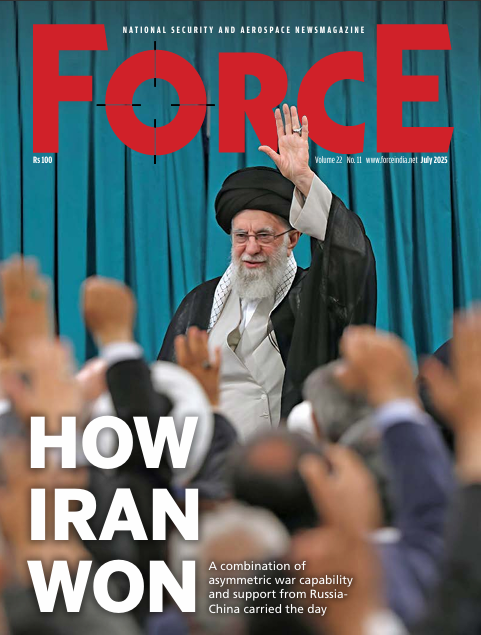A Matter of Honour
It is ironical that this article, first published in the January-March 1999 issue of the USI Journal, should appear so topical even today. At that time, the author’s stimulus, for penning this introspective piece, perhaps, was the ugly spat between the then chief of naval staff Admiral Vishnu Bhagwat and Vice Admiral Harinder Singh, both of whom took recourse in judicial intervention and the serious discontentment in the IAF due to the 5th Pay Commission’s rulings on pilots’ salaries and allowances. FORCE has chosen to re-print this article, with the author’s permission, because we believe that more than a decade after it was rendered, his advice to the officer corps may still be valid.
 Adm. Arun Prakash (retd)
Adm. Arun Prakash (retd)
Many of us have probably never heard of Jeremy Boorda. He was an American; citizen of a nation whose ethics we continuously sneer at, from the high moral pedestal of India’s ancient civilisation and culture.
I start this article with a mention of Boorda, because on 23 May 1996 he drove home from his office, drew a loaded pistol and ended his life by shooting himself in the chest.
Admiral Boorda was the four-star head of the US Navy, known as Chief of Naval Operations (CNO). The 56-year old flag officer was the first man in the history of USN to rise from the ranks to the post of CNO. In a hierarchy dominated by US Naval Academy graduates, Boorda’s humble origins meant that he had to prove himself at every rung of the ladder in his long climb to the coveted post of CNO. So what made him take his own life when he had reached the pinnacle of professional achievement? Was it cowardice, or was it a sense of honour?
For a number of years, Admiral Boorda had worn a combat insignia (the small metallic letter ‘V’) affixed to two campaign ribbons earned for shipboard service off Vietnam between 1965 and 1973. As per USN regulations, this insignia was to be worn only by personnel who were deployed in specified combat zones. A routine check by the Bureau of Personnel had revealed in 1987 that Boorda was not entitled to wear it. By the time that he became CNO, Boorda had stopped wearing the Combat ‘V’, but in April 1996, this issue had been raked-up by Newsweek magazine, which had sought an interview with him to discuss it. The interview was scheduled the day Boorda shot himself.
Were two tiny pieces of metal stuck on scraps of ribbon, as a result of what Boorda himself termed, ‘an honest mistake’ enough for him to take his life? Opinions will certainly differ, but Boorda had always stressed the long US Navy tradition of leaders accepting responsibility and accountability. He himself wanted to be seen as such a leader, and apparently could not tolerate the idea that his personal actions might dishonour the service he had joined at the age of 16.
‘Death before dishonour’ has been the creed of warriors for centuries. Roman legionnaires, Rajput princes, Japanese samurai and British military officers have lived and died by this credo. Some British regiments invoked it even off the battlefield; an officer considered guilty of a serious misdemeanour by his peers would one evening enter his quarters to find a loaded revolver in the opened drawer of his writing table. The unstated message from his comrades was stark but unmistakable: ‘Do not sully the name of Regiment by a messy court martial. Take the honourable way out’. Very often he did.
1
To return to Boorda’s case, there can be little doubt, that with some smart legal advice and hair-splitting, he could have proved that he had done no wrong, and thereafter clung to office. It is, however, obvious that he must have agonised hard over this, and come to the conclusion that his Service was more important than him, or his life.
My NDA Experience
In the current Indian environment a credo like ‘death before dishonour’ would appear melodramatic, and perhaps even comic. But, at least for the armed forces, there is another credo, more down to earth, and certainly within everyone’s reach: ‘Service before Self’, very roughly translated into Sanskrit as ‘Seva Parmo Dharma’. It is the motto of the National Defence Academy (NDA) which I have the honour to command, and which has produced a significant proportion of the officers in the armed forces today.
On taking over as Commandant, I found that the 600 or so teenagers who entered the NDA annually came from every walk of life and every social stratum imaginable. They were highly motivated young men who coped with the rigours of training far better than we did over three decades ago in the 1960s, considering that the curriculum had become far more demanding and intensive — both physically and intellectually — since. This seemed an excellent portent for the egalitarian and highly professional armed forces of our Republic. However, it became clear from a scrutiny of the range and scale of misdemeanours, which occurred in the Academy, that a large proportion of these young men had received no inputs about a value system, nor were they provided a moral foundation at home, or in school.
As a direct consequence of this absence of any ethical moorings, many of them, in the high-pressure training environment, tended to fall prey to the urgings of their more worldly-wise and less scrupulous seniors. They were told that a ‘smart’ cadet should possess the basic ‘skills’ to prevail, or at least survive in any adverse situation.
Some of the measures recommended in this unwritten ‘survival manual’ included lying, cheating, manhandling, stealing (or ‘management’ as it is euphemistically termed), and impersonation. While it may be understandable for a rudderless young cadet to eagerly grasp such concepts, what astonished me was the benign and even approving attitude of some divisional officers and squadron commanders towards such grave infractions of, what were once, sacred traditions of the Academy.
A little reflection showed that coming from the same environment, and being products of exactly the same system, these relatively junior officers did not know any better, and hence saw nothing wrong in approving something they had experienced themselves during training. It was dismaying to see how short-lived the Academy traditions apparently were because most of the officers were frankly
Subscribe To Force
Fuel Fearless Journalism with Your Yearly Subscription
SUBSCRIBE NOW
We don’t tell you how to do your job…
But we put the environment in which you do your job in perspective, so that when you step out you do so with the complete picture.








